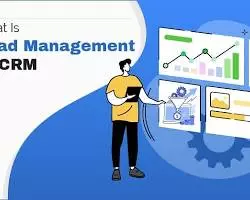Lead Management Mastery: How CRM Transforms Leads into Loyal Customers in 2024

Lead Management in CRM Software
In the competitive business landscape of 2024, lead management is not just a buzzword; it’s a critical process that directly impacts your bottom line. Effective lead management transforms potential customers into loyal brand advocates, driving sales growth and long-term success. Customer Relationship Management (CRM) systems have emerged as the ultimate tool for mastering lead management, offering a comprehensive suite of features to capture, nurture, and convert leads into paying customers.
The Lead Management Lifecycle
Understanding the lead management lifecycle is essential for maximizing its impact. The process typically involves the following stages:
- Lead Capture: Attract and capture potential customers through various channels, such as website forms, landing pages, social media, events, or referrals.
- Lead Tracking: Monitor the source and behavior of leads, tracking their interactions with your website, emails, and other touchpoints.
- Lead Qualification: Assess the quality and potential of leads based on their demographics, interests, and engagement level.
- Lead Scoring: Assign scores to leads based on their level of interest and fit with your ideal customer profile. This helps prioritize leads and focus efforts on high-potential prospects.
- Lead Nurturing: Engage and educate leads through personalized communication, providing relevant content and addressing their pain points.
- Lead Conversion: Guide qualified leads through the sales process, culminating in a successful conversion into paying customers.
How CRM Empowers Lead Management
CRM systems streamline and automate the entire lead management lifecycle, providing a centralized platform to manage all lead-related activities. Key CRM features for lead management include:
- Lead Capture Forms: Easily create and embed lead capture forms on your website and landing pages.
- Lead Scoring Models: Develop customized lead scoring models to automatically assess lead quality and prioritize high-potential prospects.
- Email Marketing Automation: Create and send personalized email campaigns to nurture leads at different stages of the buying journey.
- Lead Assignment and Routing: Automatically assign leads to sales representatives based on predefined criteria, ensuring timely follow-up.
- Lead Activity Tracking: Monitor lead interactions with your website, emails, and social media to gain insights into their behavior and interests.
- Sales Pipeline Management: Visualize your sales pipeline, track the progress of leads, and identify bottlenecks to optimize your sales process.
- Reporting and Analytics: Generate detailed reports on lead conversion rates, sources, and campaign performance to measure the effectiveness of your lead management efforts.
Tips for Effective Lead Management with CRM
- Define Your Ideal Customer Profile (ICP): Clearly outline the characteristics and behaviors of your ideal customer to ensure you’re targeting the right leads.
- Create Targeted Content: Develop relevant and engaging content that resonates with your target audience at different stages of the buyer’s journey.
- Personalize Communication: Use CRM data to tailor your communication to individual leads, addressing their specific needs and interests.
- Follow Up Promptly: Respond to leads promptly and consistently, providing timely answers to their questions and addressing their concerns.
- Monitor and Optimize: Continuously track and analyze your lead management performance, making necessary adjustments to improve results.
Conclusion
Lead management is a crucial aspect of business growth, and CRM systems are transforming how companies approach this process. By leveraging the power of CRM, businesses can effectively capture, nurture, and convert leads into loyal customers. Embrace CRM as your lead management powerhouse in 2024 and unlock a world of opportunities for sustained business success.

Fundamentals of CRM with Dynamics 365 and Power Platform

Marketing Automation For Dummies

Successful Direct Marketing Methods: Interactive, Database, and Customer-based Marketing for Digital Age (BUSINESS BOOKS)

CRM & FFHH: analysis of real accidents

Connected CRM: Implementing a Data–Driven, Customer–Centric Business Strategy

Special Edition Using Microsoft CRM
Related Guides: See all
- AI-Powered CRM: Supercharging Customer Relationships with Intelligent Automation and Predictive Insights in 2024
- Omnichannel Engagement with CRM: Crafting Seamless Customer Journeys in 2024
- Personalization Powerhouse: How CRM Drives Customer-Centric Experiences in 2024
- Customer Segmentation Mastery with CRM: Unlock Personalized Marketing and Sales Strategies in 2024
- Mastering the Customer Journey with CRM: Elevate Experiences and Boost Loyalty in 2024
- Social CRM: Building Stronger Customer Relationships Through Social Media in 2024
- Cloud CRM: Revolutionizing Business Agility and Scalability in 2024
- Mobile CRM: Empowering Sales and Service Teams on the Go in 2024
- CRM Integration and API: Unifying Your Business Ecosystem for Seamless Operations in 2024
- Data-Driven Decisions with CRM: Harness the Power of Reporting and Dashboards in 2024